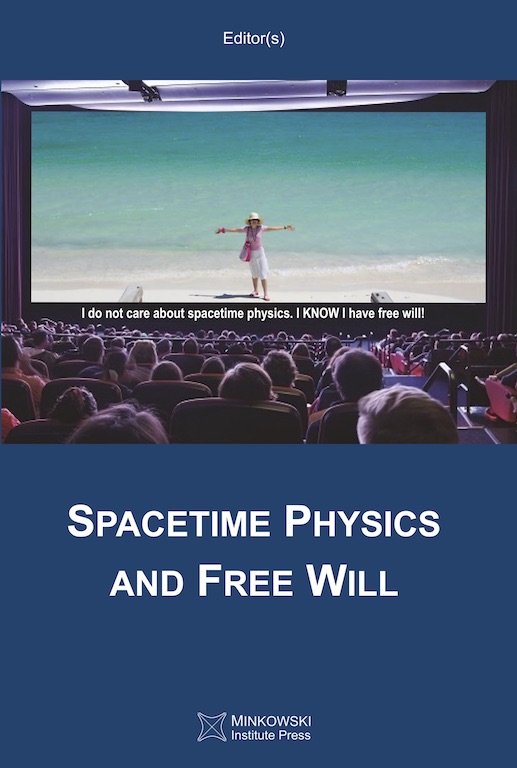 |
|||||
|
|||||
|
|
Watching the main character in an old movie confidently declare "I do not care about spacetime physics. I know I have free will!" we can only smile because we know that past, present and future (in the movie) are given at once on the filmstrip; so the main character's "actions" are predetermined since they are all given on the filmstrip. The filmstrip seems to be the best visualization of how the whole history of the perceived by us three-dimensional world is given en bloc in spacetime.
Dear Colleagues, Minkowski Institute Press invites contributions to its most challenging and probably most ambitious project - a volume tentatively entitled "Spacetime Physics and Free Will." The reason for choosing this title - not, for example, "Physics and Free Will" or "Science and Free Will" - is that it is spacetime physics, particularly the nature of spacetime (whether spacetime represents a real four-dimensional world or is nothing more than a mathematical space), that has posed the greatest intellectual challenge that humankind has ever faced: If spacetime is real, we do not have free will because our physical bodies are forever given (four-dimensional timelike) worldtubes, which contain at once (en bloc) our entire lives (like a filmstrip which contains at once the entire story of a movie). No matter what is going on in our brains, that is irrelevant for the reality of our physical worldtubes and spacetime because, obviously, it is the experimental physical evidence that determines their reality. So, it is spacetime physics that decides whether or not we have free will - if the world is four-dimensional free will does not exist; if reality is something else - a three-dimensional world (which is ruled out by experiment) or a growing / evolving block universe - free will may or may not exist. I think it is exceedingly clear that the only way to eliminate this challenge is to refute the existing arguments for the reality of spacetime, starting with Minkowski's own arguments. Inexplicably, these arguments of unprecedented strength (because experiments would be impossible if spacetime were not real) have been ignored although it seems self-evident that such incomprehensible attitude is closer to the irrational "This cannot be because it cannot be" than to science... That is why, in order to be considered (peer reviewed), all contributions must explicitly address at least Minkowski's arguments for the reality of spacetime, which are based on experimental physics (and eventually the relativistic experimental evidence after Minkowski's death). The reason for this strict requirement is clear - any discussion of free will that does not address those arguments is nothing more than an insignificant unscientific chat. Best wishes,
Vesselin Petkov
"Objectively, there is, after all, no free will." "I do not believe in free will. Schopenhauer's words: 'Man can do what he wants, but he cannot will what he wills,' accompany me in all situations throughout my life and reconcile me with the actions of others, even if they are rather painful to me. This awareness of the lack of free will keeps me from taking myself and my fellow men too seriously as acting and deciding individuals, and from losing my temper." "If the moon, in the act of completing its eternal way around the earth, were gifted with self-consciousness, it would feel thoroughly convinced that it was traveling its way of its own accord... So would a being, endowed with higher insight and more perfect intelligence, watching man and his doings, smile about man's illusion that he was acting according to his own free will." Description: Coming soon
|
||||
